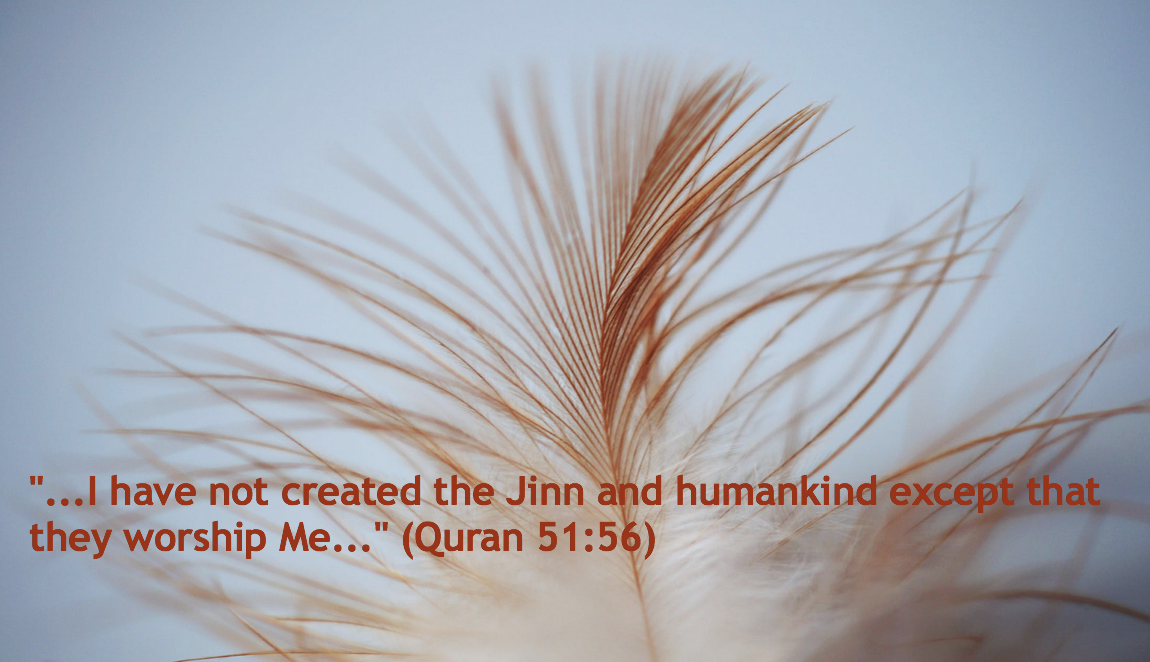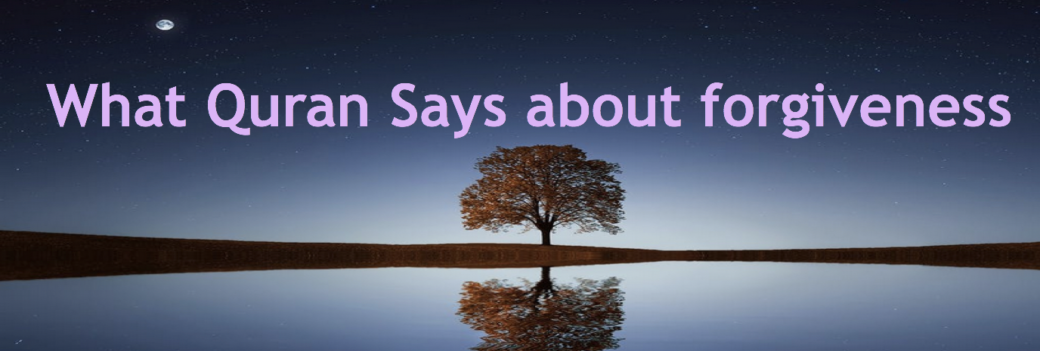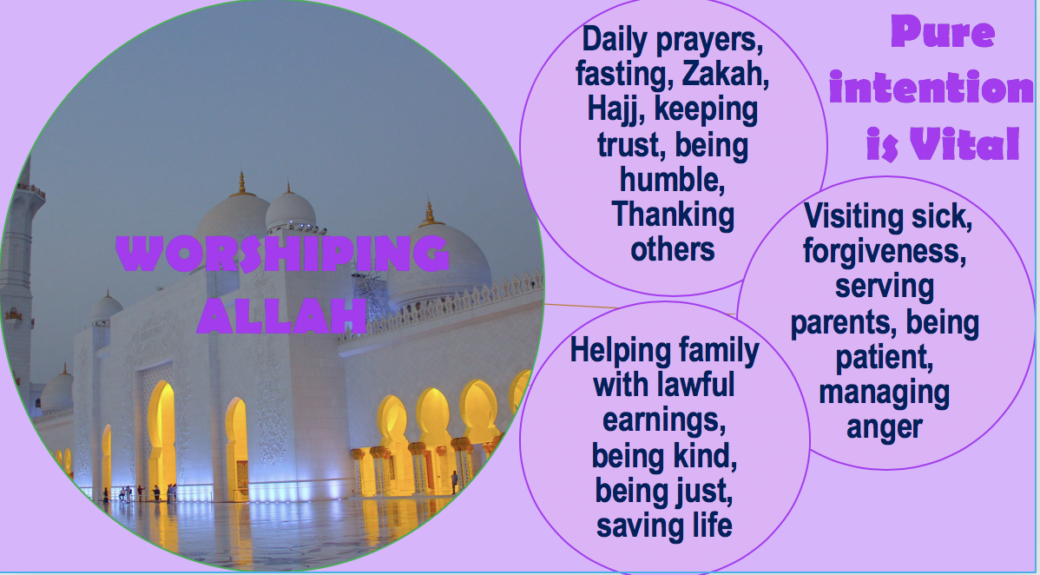
Seeking Allah’s Pleasure
The Quran emphasizes that worshiping God is the primary purpose of human existence. The primary goal of worship in Islam is to draw near to God, establish and sustain a spiritual connection with the Sublime, and seek His pleasure. In Islamic worship, there is no physical or mental imagery of God. Human vision and imagination work within the physical world, which is God’s creation, while God Himself is beyond comparison to anything created. God, in His glory, is omnipresent. He is nearer to us than our jugular vein (Quran 50:16). However, our evil actions and rejection of His presence can create spiritual distance from Him. Thus, the purpose of worship in Islam is to comply with God’s will and seek His pleasure and mercy, ultimately achieving salvation. http://corpus.quran.com/translation.jsp?chapter=50&verse=16
“Quran 50:16, “And indeed We have created man, and We know whatever thoughts his inner self develops, and We are closer to him than (his) jugular vein.”
“Quran 112:4 “…and nothing could be compared with Him.”
“Quran 6:103, “Vision cannot comprehend Him, but He comprehends all vision, and He is absolutely subtle the Aware One.”
Submission In Peace
Our worship of Allah goes beyond merely following and practicing religious rituals. **Ibadah** (عباد) is the Arabic term for worship, which encompasses voluntary submission to the Creator and adherence to His prescribed way. Ibn Taymiyyah, a classical Islamic scholar, described worship as “a comprehensive term that includes all that Allah loves, words and deeds, whether inward or outward.”
Ritual worships
Ritual worship is fundamental to practicing Islam and plays a crucial role in shaping a Muslim’s daily life. Here are some key ritual worship practices in Islam.
Salah (Prayer): Muslims perform five daily prayers at prescribed times: Fajr (dawn), Dhuhr (midday), Asr (afternoon), Maghrib (sunset), and Isha (night). Prayer involves specific physical postures and recitations, serving as a direct link between the worshiper and Allah.
Zakat (Charity): This obligatory almsgiving requires Muslims to give a portion of their wealth (usually 2.5%) to those in need. Zakat purifies wealth, diverts it to those in need, and promotes social justice.
Sawm (Fasting): During the holy month of Ramadan, Muslims fast from dawn to sunset, refraining from food, drink, and other physical needs. Fasting teaches self-discipline and empathy for the less fortunate and helps spiritual growth.
Hajj (Pilgrimage): This pilgrimage to the holy city of Makkah is required once in a lifetime for physically and financially able people. It includes a series of rituals performed over several days to commemorate the actions of the Prophet Abraham and his family.
Yet, Muslim worship is not limited to ritual prayers. In Islam, the essence of worship is to live a life that reflects one’s devotion to Allah in all aspects, whether through ritual acts or daily interactions and responsibilities. Worship encompasses everything that is done with the right intention to seek Allah’s pleasure.
The Tool For Worship: Moral Purity
The Quran teaches that Allah created human souls long before our physical bodies were formed. In the process of creation, Allah infused “some of His own spirits” into humanity (Quran 32:9, 38:72). This bestowed upon us many sacred qualities, such as awareness of God’s presence, kindness, justice, gentleness, love, forgiveness, creativity, and knowledge. The purpose of worship in Islam is to nurture these virtues by practicing them in our lives, thereby drawing us closer to God. When these virtues are absent from our actions, we open ourselves to injustice, arrogance, falsehood, and the desire for revenge, which distance us from God’s nearness. https://qpeace.net/?p=878
Some Acts of Worship


Some Acts of Worship: Being Merciful and Kind to the World.
Allah, the Most Merciful and Kind, desires that we embody these qualities by extending mercy and kindness to others. Each chapter of the Quran begins with the proclamation of Allah’s Mercy and Kindness, emphasizing that His Mercy encompasses all creation. Believers are expected to show mercy and kindness to everyone, including animals and the environment. Being merciful to our parents, spouses, neighbors, the disabled, orphans, and the sick is integral to worshiping God.
Qur’an 22:65, “Surely Allah is the Kindest and Most Merciful to people.”
Qur’an 30:21, “And of His signs is that He created for you, from yourselves, mates that you may find tranquility in them; and He placed between you affection and mercy. Indeed, those are signs for people who give thought.”

Sayings of Prophet Muhammad (peace be on him)
“Whoever does not show mercy to those on earth will not receive the mercy of He who is in the Heavens.” Prophet Muhammad (SAW).
“Kindness is not found in anything except that it adds to its beauty, and is not withdrawn from anything except that it makes it deficient.” Prophet Muhammad (SAW).
“He is not a perfect Muslim who eats his fill while his neighbor goes hungry.” Prophet Muhammad (SAW).
 Some Acts of Worship: Acting Just
Some Acts of Worship: Acting Just
Justice is a fundamental principle in Islam. Being just in Islam means treating others with fairness, equity, and respect and ensuring that rights are upheld for all. Islam promotes equality of humanity, regardless of race, ethnicity, or social status. Every individual is entitled to fair treatment and justice. Upholding justice requires honesty and integrity in all dealings, whether in personal relationships, business transactions, or legal matters.
Islam condemns all forms of oppression as a form of injustice. Believers are urged to stand against injustice and support those who are oppressed. Justice in Islam is balanced, considering individual rights and the community’s welfare. *The Prophet Muhammad (peace be upon him) is reported to have said, “Be conscious of Allah and be just among your children” (Sahih al-Bukhari). This statement highlights the importance of fairness and justice, even within the family. Striving for justice is an ongoing commitment for Muslims, and it reflects their dedication to living by divine guidance.
Quran 95:8, “…Is not God the most just of judges?”
Quran 6:115, “And the Word of your Lord has been fulfilled in truth and justice. None can change His Words.”
Quran 4:135, “O you who believe! Stand out firmly for justice, as witnesses to Allah, even if it is against yourselves, or your parents, or your kin, and whether the person be rich or poor: for Allah can best protect both. Do not follow your desire, lest you swerve, and if ye distort (justice) or decline to do justice, verily Allah is well aware of all you do.”

Some Acts of Worship: forgiving others.
Forgiving others is an act of worship. Allah favors forgiveness over revenge, even if we are wronged and can take revenge on the perpetrator.

Quran 42:40, “And the recompense of evil is punishment like it, but whoever forgives and amends, he shall have his reward from Allah; surely He does not love the unjust.”
Quran 41:34,”…Not equal are the good and bad deeds. Repel evil by that which is better; the one hostile to you will become a devoted friend.”
Quran 39:53, “O My Devotees, who have committed excesses against their selves, do not despair of the mercy of Allah. Surely, Allah forgives all sins. Indeed, He is the Most Forgiving, the Merciful.”
Some Acts of Worship: Earning Knowledge
Allah, our Creator and the source of all knowledge, is honored through learning and reflecting on His magnificence. In Islam, seeking knowledge about Islam and Allah’s created universe is an essential act of worship. Upon acquiring knowledge, we are responsible for using it positively, benefiting others, and avoiding harm. We must employ our knowledge to enhance the human condition and acknowledge Allah’s Greatness and Magnificence.
Misusing knowledge can lead to significant harm, arrogance, or rejection of the Creator. Understanding the purpose of worship in Islam is crucial, as it guides us in using our knowledge in a way acceptable to Allah and considered an act of worship.

Quran 3:191, “Surely in the creation of the heavens and the earth, and the alteration of night and day, there are signs for the people of wisdom, who remember God standing, sitting and (lying) on their sides and reflect on the creation of the heavens and the earth: “Our Lord, You have not created all these without meaning and purpose…..”
The Quran 2:29, “It is He who has created for you all that is on earth, and has applied His design to the heavens and fashioned them into seven heavens, and He alone has full knowledge of everything.”


Intent: The Key in Worship
The purpose of worship in Islam is to seek the pleasure of the Creator, and this is closely tied to the sincerity of our intentions. Prophet Muhammad (SAW) emphasized that actions are judged based on intentions. For example, a public display of generosity intended to show off may not be considered pious. Similarly, performing acts of worship to appear devout in front of others does not count as true worship for Allah’s sake. On the other hand, a scientist working in a laboratory to find a cure for a disease, or someone furthering knowledge of the universe, serving humanity to earn Allah’s pleasure, and appreciating His glory through their works, will be rewarded by Allah as an act of worship.






2 Trackbacks / Pingbacks